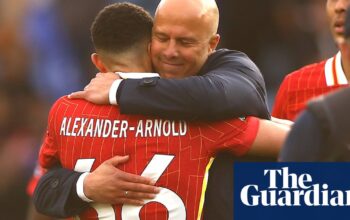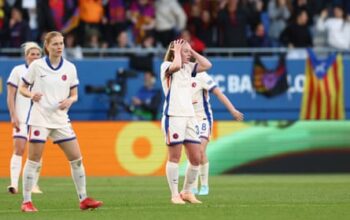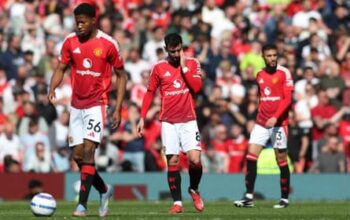Dani Olmo would like to set the record straight. “David Raum claimed he had blocked me but I can categorically deny that,” he says.
He and his RB Leipzig teammates, not just Raum but Benjamin Henrichs too, have been on the phone a bit the past few days. There’s been no bet, but there has been a warning. “‘Look out!’ ‘Don’t come to my wing!’ – the usual,” Spain’s No 10 says. “People sometimes think it’s a big deal, but it’s normal.”
With that, he flashes a smile he hasn’t properly fixed since a training-ground elbow from Christoph Baumgartner knocked two teeth out, but says he will once the Euros are over.
Sometimes the danger from those Red Bull boys is real. Spain versus Germany in the quarter-final is a very big deal: a clásico, Olmo calls it. For him, there’s something extra.
One of two Spain internationals playing in Germany, along with the Bayer Leverkusen left-back Álex Grimaldo, he may be more appreciated there than back home, where he has never played professionally. His partner, Laura, is German; he faces teammates and best mates; and then there’s the coach who took him there in the first place, playing a big part in bringing him here, a key part of a unique career path.
Olmo joined Barcelona’s La Masia at nine but shocked everyone by walking away to make his debut for Dinamo Zagreb at 16, winning five league titles. When he left Croatia, in 2020, Julian Nagelsmann was the first on the phone, explaining where he would fit and how he would develop at Leipzig. Bigger calls came – from Milan and Hertha Berlin, Jürgen Klinsmann on the line – but Olmo had given his word.
Although he started on the bench – one day he knocked on the manager’s door and asked what was going on – the decision was good for him. He reached three consecutive German Cup finals, even if Nagelsmann had soon left. Now the coach who believed in him, nurtured him stands before him and a place in the semi-final.
“We’ve not seen each other for a while, not since [he was at] Bayern, and I haven’t spoken to him recently,” Olmo says. “But he knows me well. And I know him well too.
“His way of playing has changed a bit from what it was like at Leipzig. We played with a line of five and wing-backs, now he plays with a false full-back like [Joshua] Kimmich, who moves inside.
“He’s flexible but you still see similar things to what he did then, his idea. And Germany are very strong.
“They have an impressive group and great individuals,” he says, running through them: Havertz, Wirtz, Gündogan, Schlotterbeck, Rüdiger. Raum and Henrichs too. And his favourites: Kroos and Musiala.
“They’re a tough opponent, this could be a final,” he says. “Until now, we haven’t lost and nor have Germany. In the last 16, once that [Denmark] goal had been ruled out they progressed comfortably. The numbers say we’re the best two teams.”
When Niclas Füllkrug scored late against Switzerland to put Germany back in Spain’s path, swapping them from one side of the draw to the other, it must have been tempting to curse their luck. “Well,” Olmo starts to say. There’s a pause, a smile. “I wouldn’t say that … in the end, if you want to reach the final, you have to face the best teams.” But there are routes and there are routes. “Yes, that is true,” he says. “But I’d rather play them now than in the final and if you’re going to win it, you’re going to have to beat Germany, so let’s go for it.”
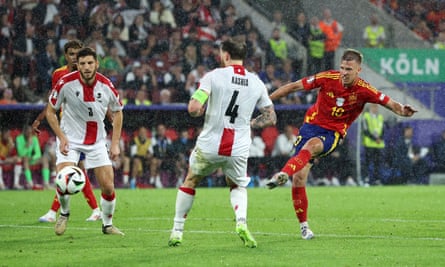
So far, Spain have. This is a different national team: “a bit more direct,” in Olmo’s words. “We try to take risks a little bit more,” he says. “Structurally it’s different to before. With Luis Enrique I played more on the wing, sometimes as a No 9, sometimes as an inside midfielder, but that No 10 position didn’t exist, which is where I feel best. [Luis] de la Fuente knows me perfectly, he knows where I can perform.
“I’m not one who says we needed a change [after Qatar]. For me, Luis Enrique was and is an incredible coach. He helped me so much and I think we deserved much more, both at the last Euros and at the World Cup. But they decided on a change and we’re playing well. We’ve changed some players but we also have many from the last Euros, the same spine. Some things have changed but a lot stays the same.
“Most of us here have been fortunate enough to have worked with Luis de la Fuente in the Spain youth teams too. I won the under-21 Euros with him [in 2019] and an Olympic silver. The idea is basically the same at senior level as at youth level. He gives us freedom in the last third to play our game. We have known each other for years, we have lived a lot of experiences together. When I was injured, during the hard times, he always kept in touch.”
De la Fuente, like Luis Enrique, backed Olmo when he might have been overlooked. His is an unusual career path, after all. Born in Terrassa, Catalonia and guided by his father, Miquel, a football coach, Olmo took the unexpected step of moving to Zagreb rather than awaiting opportunities at Barcelona – so unexpected that they kept calling him, wondering where he was, unable to believe what he had done. From there he moved to Leipzig.
If that took him from the public eye, made it too easy to ignore his progress, every decision was carefully analysed and there are no regrets. He believes it not only provided him with opportunities that might have been denied but has made him a better player, one with a different set of qualities that suit Spain’s recent shift: a hybrid, a synthesis of styles.
after newsletter promotion
‘It’s a totally different path, to leave Barcelona and go to Croatia, to be there from 16 to 21, makes you grow. I was looking for that.
“Even though kids are playing here at the Euros at 16, 17, it wasn’t like that then. I learned things that maybe if I had stayed in Spain I would not have learned. I am the player I am because of that and because of Germany. If I had stayed in Spain, who knows what would have happened … Would I have been given the chance? I don’t know, nor does anyone.”
The question is what happens next. It is hard to avoid the pull of home and, at 26, it may be time to move again. Bayern are interested, long since enamoured of his play. Olmo has a €60m (£50.8m) release clause until 15 July, the day after the final.
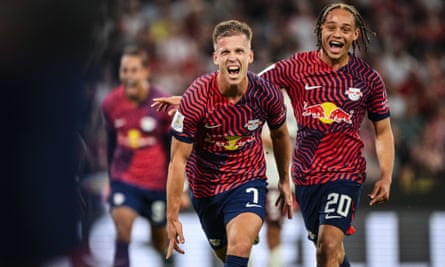
“My people are working on it. They know what I think, what I want,” he says. “I’m here at the Euros, focused on what matters, which is playing and hopefully winning it.
“In Spain, they don’t follow the Bundesliga so maybe here they know me a bit more in Germany. In the end, though, anyone who knows football knows me well. In the Bundesliga, they know me, they have me in high esteem, and I feel that. And here too. Every time I am with Spain, with the coaching staff and my teammates, I feel comfortable.
“I don’t have anything to prove to anyone but if anyone has doubts a tournament like this is always a good thing. Every time you come it is a chance to show [them].
“I was clear. What Dinamo offered me in sporting terms no other team could offer me. The objective was clear: to be a professional. Dinamo has always been a club that gets young players, develops them, knows how to use them, sells. That was good for me. In Germany, I would say I’ve learned another type of football: a more direct, more vertical. The Red Bull Leipzig idea. Attack the space with fast, direct forwards. It’s a kind of football I have inside of me. Get the ball, go forward, be vertical, shoot from far out.
“With the national team we play calmer, with more possession, but also when we have to go forward we do. We have two bullets up front, with Nico [Williams] and Lamine [Yamal]. We have [Álvaro] Morata, a very vertical striker. I try to have that mix of Leipzig and the selección. I’m the player I am because of my time in Spain, Croatia, Germany. You learn from every experience.”
Even the ones that ultimately turned out bad. “I would say that the last game at the last Euros was maybe my best for Spain. It’s about the stage too: Italy at Wembley, a semi-final.” That night, he provided an assist and a performance that Giorgio Chiellini summed up in two words: mamma and mia. Spain, though, lost on penalties. “All we were missing was that touch of luck. I wouldn’t say that’s a thorn in our side still, but it is something you have to live with, use. Many of us there then are here now: we have that experience. That lets us mature, learn. In the end, it all helps.”
And what did you learn? Olmo smiles. “That when you have the opportunity, you have to grab it. And you have to score a goal more than your opponent, don’t you? However well you play, you have to put the ball into the goal. Sometimes that’s enough.”
Source: theguardian.com
